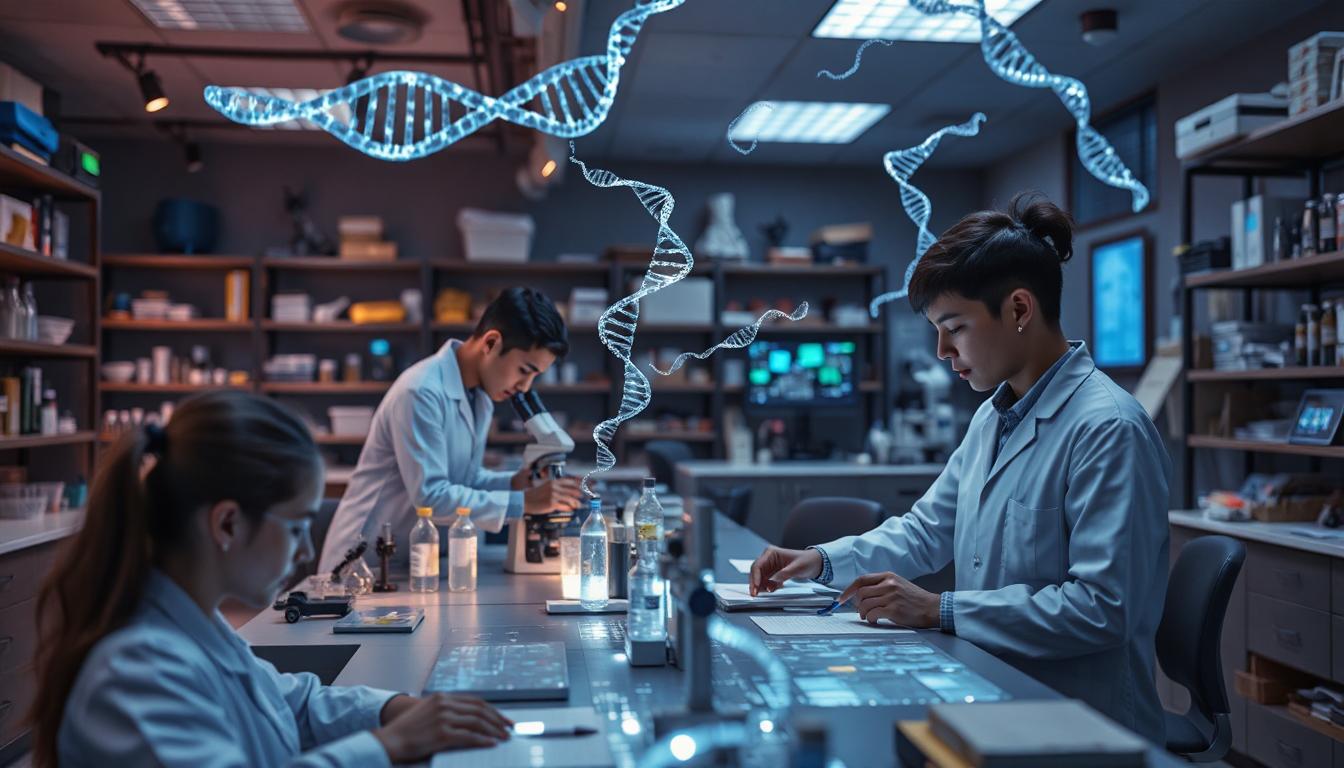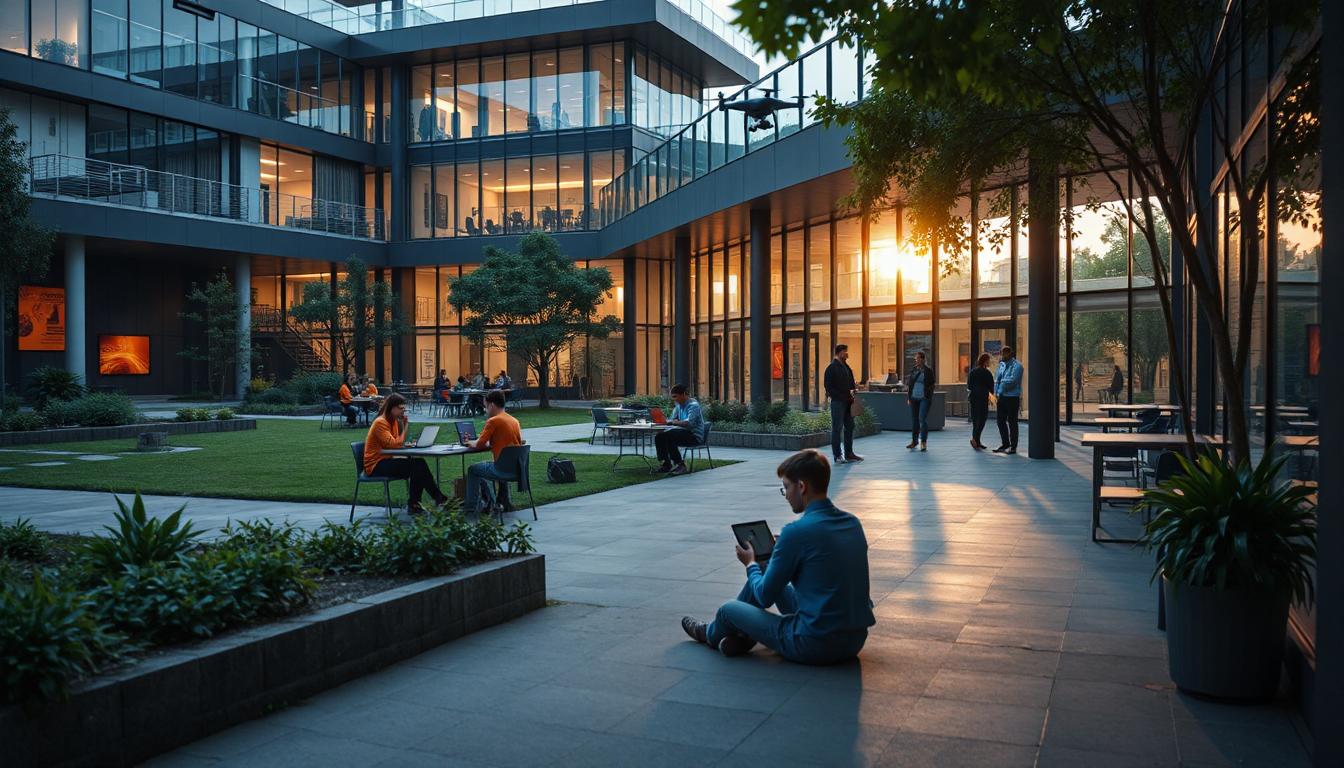Biotechnology Engineering Programs: Scope, Career & Courses | MCSGOC
Biotechnology Engineering Programs

Introduction: The Era of Biotechnology
The 21st century is witnessing an unprecedented convergence of biology and technology. From groundbreaking medical therapies to agricultural advancements and bioenergy, biotechnology has become a cornerstone of innovation. Biotechnology Engineering is not just a profession; it is a discipline that holds the key to solving some of humanity’s most critical challenges, including food scarcity, disease eradication, and environmental sustainability.
At MCSGOC (Dr. M.C. Saxena Group of Colleges, Lucknow), our Biotechnology Engineering Programs are meticulously designed to produce competent engineers, researchers, and innovators ready to lead this biotech revolution. This academic guide provides a comprehensive overview of biotechnology engineering as a field of study and career, detailing the programs offered, career scope, research opportunities, and why MCSGOC is a top destination for aspiring biotech engineers.
What is Biotechnology Engineering?
Biotechnology Engineering is an interdisciplinary branch of science that integrates biology with technology. The core objective of biotechnology is to manipulate living organisms or their components to develop products and technologies for the welfare of humans and the environment.
Key Components of Biotechnology Engineering:
- Genetic Engineering: Altering genetic material to produce desired traits.
- Bioprocess Engineering: Designing systems for large-scale biological production.
- Molecular Biology & Biochemistry: Understanding cellular processes at a molecular level.
- Bioinformatics: Using computational tools to analyze biological data.
- Environmental Biotechnology: Developing eco-friendly technologies like bioremediation.
Biotechnology Engineering thus combines life sciences with technical know-how to create impactful innovations.
Historical Context and Evolution
The origins of biotechnology date back to ancient civilizations using yeast for brewing and fermentation. However, modern biotechnology began in the 1970s with the invention of recombinant DNA technology. Since then, the field has exploded into various domains such as:
- Biopharmaceuticals
- Agricultural Biotechnology
- Industrial Biotechnology
- Environmental Biotechnology
Biotechnology Engineering Programs today are far more advanced, incorporating cutting-edge research in genomics, proteomics, nanotechnology, and artificial intelligence in biology.
Importance of Biotechnology in the Modern World
The relevance of biotechnology is evident in multiple sectors:
| Sector | Application |
|---|---|
| Healthcare | Vaccine development, gene therapy, diagnostics |
| Agriculture | Genetically modified crops, biofertilizers |
| Environment | Pollution control, waste management, biofuels |
| Industry | Fermentation technology, bio-based materials |
Biotechnology is directly linked to global goals like food security, health improvement, and environmental sustainability. Therefore, the demand for trained biotechnology engineers is rising exponentially.
Biotechnology Engineering Programs at MCSGOC
At MCSGOC, we offer comprehensive Biotechnology Engineering Programs that combine theoretical knowledge with hands-on practical skills. Our curriculum is regularly updated to keep pace with industry standards and global research trends.
Programs Offered:
| Program | Duration | Eligibility |
|---|---|---|
| B.Tech in Biotechnology | 4 Years | 10+2 with PCM/PCB |
| M.Tech in Biotechnology | 2 Years | B.Tech/B.Sc. in Biotechnology or related field |
| Diploma/Certificate Courses | 6-12 Months | 10+2/Graduation (as per course) |
B.Tech in Biotechnology at MCSGOC
Course Overview:
The B.Tech Biotechnology Program at MCSGOC is an undergraduate engineering degree focusing on:
- Molecular biology
- Genetic engineering
- Industrial biotechnology
- Environmental biotechnology
- Bioinformatics
Detailed Curriculum:
| Year | Key Subjects |
|---|---|
| Year 1 | Engineering Mathematics, Physics, Chemistry, Introduction to Biotechnology |
| Year 2 | Cell Biology, Microbiology, Biochemistry, Biostatistics |
| Year 3 | Genetic Engineering, Immunology, Bioprocess Technology, Bioinformatics |
| Year 4 | Industrial Biotechnology, Environmental Biotechnology, Project Work, Internship |
M.Tech in Biotechnology at MCSGOC
Advanced Studies:
The M.Tech Biotechnology Program is designed for specialization and research. Students explore advanced topics like:
- Recombinant DNA Technology
- Nano-biotechnology
- Stem Cell Technology
- Bioprocess Modeling and Simulation
- Drug Discovery and Development
Students are encouraged to publish research papers and participate in global conferences, building a strong academic portfolio.
Research and Innovation at MCSGOC
Research is at the core of our Biotechnology Engineering Programs. MCSGOC provides opportunities in:
- Stem Cell Research
- Genomics and Proteomics
- Cancer Biology
- Environmental Bioengineering
- Agricultural Genomics
We collaborate with leading biotech industries and research institutions to facilitate internships and live projects for students.
Infrastructure and Labs at MCSGOC
MCSGOC offers state-of-the-art infrastructure to support academic and research activities in biotechnology:
Key Facilities:
- Molecular Biology Lab
- Microbiology Lab
- Bioinformatics Lab
- Tissue Culture Lab
- Bioprocess Engineering Lab
- Analytical Instrumentation Lab
These facilities ensure students get practical exposure to the latest technologies.
Skill Development and Industry Readiness
Biotechnology engineers must possess a blend of technical and soft skills. MCSGOC focuses on:
- Laboratory Skills
- Data Analysis
- Critical Thinking
- Communication and Collaboration
- Ethical Scientific Practice
- Innovation Management
Regular workshops, seminars, and guest lectures by industry experts keep students updated.
Career Opportunities After Biotechnology Engineering Programs
Graduates of Biotechnology Engineering Programs have diverse career options across multiple industries:
Healthcare and Pharmaceuticals
- Drug Manufacturing
- Biopharmaceuticals
- Clinical Trials
- Diagnostic Technologies
Agricultural Biotechnology
- GM Crops Development
- Biopesticides and Biofertilizers
- Precision Farming
Industrial and Environmental Sectors
- Waste Treatment
- Biofuel Production
- Industrial Fermentation
Bioinformatics and Computational Biology
- Genomic Data Analysis
- Drug Design Simulations
- AI in Biotechnology
Emerging Fields in Biotechnology
Biotechnology is expanding into new domains, offering exciting career possibilities:
| Field | Application |
|---|---|
| Synthetic Biology | Designing artificial biological systems |
| CRISPR-Cas9 Technology | Gene Editing |
| Nanobiotechnology | Nano-scale biological interventions |
| Personalized Medicine | Tailoring treatments to individual genetic profiles |
These fields are redefining the role of biotechnology in society.
Global and Indian Biotech Industry Outlook
According to reports by IBEF (India Brand Equity Foundation) and BIO India, the Indian biotech sector is expected to:
-
Reach $150 billion by 2025
-
Generate over 3 million jobs
-
Become one of the top 3 biotech hubs globally
This growth creates tremendous opportunities for students of Biotechnology Engineering Programs at MCSGOC.
Top Recruiters for Biotechnology Graduates
MCSGOC alumni work in reputed organizations such as:
- Biocon
- Serum Institute of India
- Dr. Reddy’s Laboratories
- Nestlé
- Wockhardt
- Hindustan Unilever
- Cipla
- Monsanto
Additionally, many graduates pursue higher education and research opportunities in top universities worldwide.
Entrepreneurship in Biotechnology
Biotechnology is a fertile ground for startups. India has seen a surge in biotech entrepreneurship in fields like:
- Nutraceuticals
- Biopharmaceuticals
- Agricultural Innovations
- Health-tech Platforms
At MCSGOC, students are encouraged to participate in innovation challenges and incubator programs to turn their ideas into viable startups.
Global Collaborations and Internships
MCSGOC collaborates with biotech industries and research labs for:
- Summer Internships
- Research Projects
- International Exchange Programs
These collaborations ensure students gain real-world experience during their Biotechnology Engineering Programs.
Admission Process at MCSGOC
Step-by-Step Guide:
- Application Form: Visit MCSGOC
- Eligibility Check: Based on academic scores and entrance exams
- Document Submission: Academic transcripts, ID proofs
- Counseling and Selection: Based on merit and interview
- Enrollment: Secure your seat by completing formalities
15 Frequently Asked Questions (FAQs)
Q1. What is Biotechnology Engineering?
It is an engineering discipline combining biology and technology to create products that benefit society.
Q2. What are the eligibility criteria for B.Tech Biotechnology at MCSGOC?
10+2 with PCM/PCB and minimum 50% marks.
Q3. Can PCB students pursue Biotechnology Engineering Programs?
Yes, students with Physics, Chemistry, and Biology are eligible.
Q4. What is the average package after completing Biotechnology Engineering?
Entry-level packages range from ₹3 to ₹5 LPA, depending on the sector and role.
Q5. Does MCSGOC provide research opportunities?
Yes, MCSGOC encourages student research in biotech innovation.
Q6. What industries hire biotech engineers?
Pharmaceuticals, agriculture, food processing, healthcare, and environment sectors.
Q7. Are internships compulsory?
Yes, internships are a mandatory part of the curriculum.
Q8. What is the scope of Biotechnology in India?
Biotechnology is a booming sector in India with applications in healthcare, agriculture, and environment.
Q9. Do Biotechnology Engineering Programs include coding or programming?
Bioinformatics requires basic programming, usually in Python, R, or MATLAB.
Q10. Can I become a scientist after B.Tech in Biotechnology?
Yes, but pursuing M.Tech or Ph.D. is recommended for research roles.
Q11. Are there international opportunities after Biotechnology Engineering?
Yes, graduates can work in global biotech companies or pursue higher studies abroad.
Q12. What is the difference between biotech engineering and biomedical engineering?
Biotech focuses on biological product development, while biomedical focuses on medical devices.
Q13. Does MCSGOC offer scholarships for Biotechnology students?
Yes, merit-based scholarships are available.
Q14. What is the role of AI in Biotechnology Engineering Programs?
AI is used in genomics, drug discovery, and predictive diagnostics.
Q15. How do I apply for Biotechnology Engineering Programs at MCSGOC?
Visit mcsgoc and fill out the online application form.
Conclusion
The field of Biotechnology Engineering is not just about science; it is about shaping the future. Whether it is developing life-saving drugs, improving crop yields, or finding sustainable energy solutions, biotechnology engineers are at the forefront of innovation.
At MCSGOC, we are committed to delivering the best Biotechnology Engineering Programs to nurture future scientists, engineers, and leaders. With our world-class infrastructure, industry tie-ups, and research-driven curriculum, students are equipped to meet global challenges and make meaningful contributions to society.
If you aspire to become a biotech professional and make a real difference, join MCSGOC’s Biotechnology Engineering Programs today.
Read More: Future of Electronics and Communication Engineering in Lucknow







